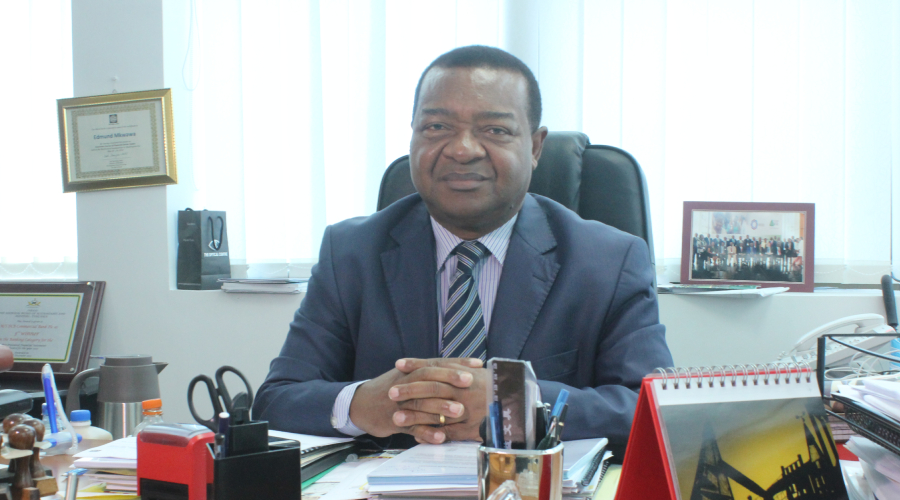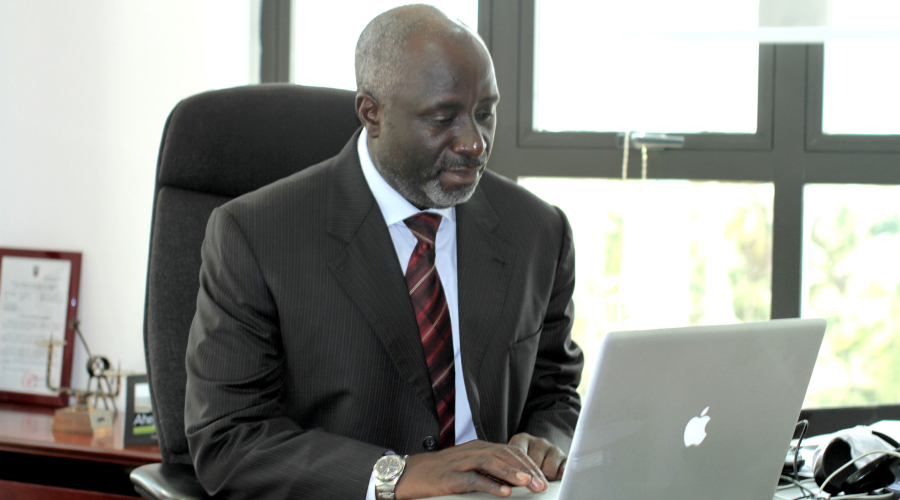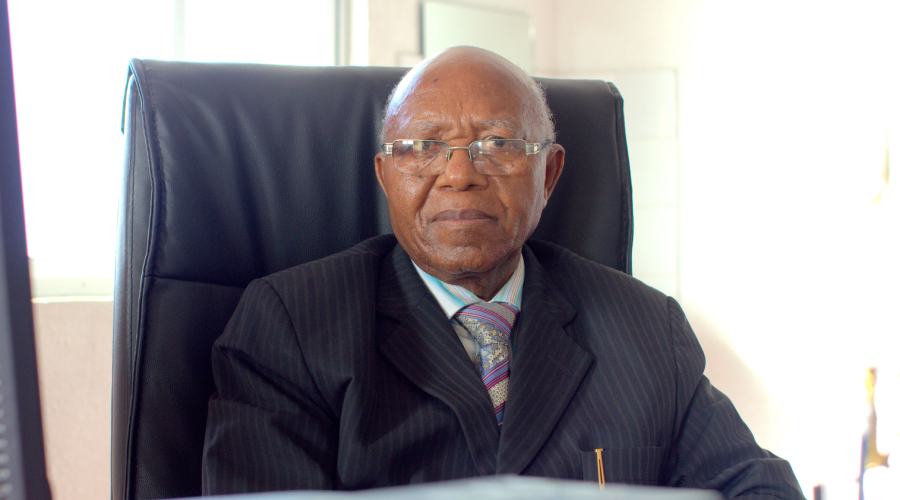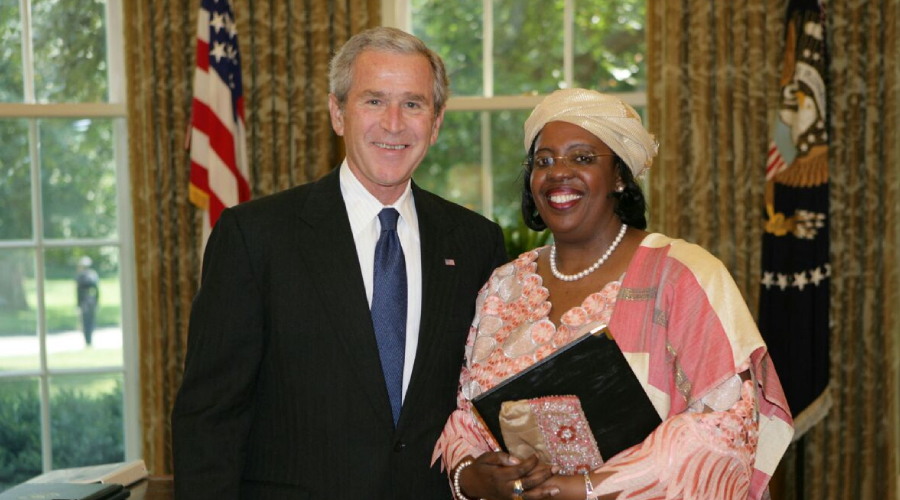From small beginnings Mkwawa climbs to great heights

As a seasoned banker with 45 years of experience in banking Edmund Mkwawa says “A banking career is a very noble career, but it requires a committed, dedicated and an honest person.”
Mkwawa decries young men with false ideas that once employed in the banking sector they will steal and be rich. Yet, he worked in the banking industry for about 45 years and met none who stole and became successful.
With this reality in mind, he rose from a bank clerk to various managerial levels in the National Bank of Commerce (NBC), which was the biggest bank in then Socialist Tanzania.
When the wind of change blew and exposed Tanzania to the market economy, he became the first Managing Director of Dar es Salaam Community Bank (DCB), the post he still held when he gave this interview. Through his leadership, he pioneered the bank to become one of the few successful micro-finance banks in Tanzania.
Who’s who Tanzania consulted Mkwawa to share his views on his journey to success and below is an interview with him when he was still NBC Managing Director.
Who’s who Tanzania: Would you kindly tell us about your educational journey?
Edmund Mkwawa: I was born in Iringa Town along Mshindo Street on October 30, 1947. I attended Consolata Primary School for four years and then went to Kalenga, a Native Authority Middle School from Standard Five to Eight and completed in 1962. I joined Tosamaganga Secondary School in 1963 and completed Form Four in 1966. I joined the National Bank of Commerce in 1968 as a clerk.
I was also fortunate to study while I was working. I went for a Master’s Degree in Community Economic Development at the Southern New Hampshire University in the USA. I also attended a course on Principles and Best Practices of Micro-finance in 1997, at the Economics Institute, Colorado, in the USA. In 1981, I went for an Executive Development Programme Management Skills and International Bank Operations course at the Bankers Trust London. In 1993 I attended a course on International Trade Finance offered by Euro-Money Institute of Finance in Johannesburg, South Africa.
I attended a management course on Effective Chief Executive Programme in Dublin, Ireland, in 2003.
Who’s who Tanzania: Tell us about your time at NBC Bank?
Edmund Mkwawa: In 1969 the National Bank of Commerce (NBC) was the only commercial bank in Tanzania and was by then the biggest bank in sub-Saharan Africa. Initially, it was very well-managed. It had structures and proper training, but later it became too big to be managed with branches in every district with determination to reach every division. Manpower challenges affected efficiency and good service delivery. I joined NBC in 1968 as a clerk. I remember the first course that we all used to go through was the Junior Bankers Course. At that time when you joined the bank there was a career path. You start as a clerk and after five years, you become Supervisor Grade B. After another two years you would become Supervisor Grade A. That was a clear scheme of service.
There were courses for one to attend and exams to pass. So, there was a clear and distinct career path that I had to go through. Through this career training process in 1972 I was successfully awarded a Diploma in Banking.
Who’s who Tanzania: Briefly how did you rise to become an icon in the banking sector?
Edmund Mkwawa: After my initial training and experience in in 1973 I became Branch Manager Grade Five in Babati District, Arusha Region. NBC bank branches were graded from Grade 5 to Grade 1.
Babati Branch was Grade 5. All the district’s banks that you knew that were established during decentralisation during those days were Grade 5.
That is the position level which any new manager would start and deal mostly with current and Savings Account, General Ledger and Lending. If you proved to be good and honest, you would be moved to a Grade 4 branch. In that respect, I was promoted to head Arusha NBC Mount Meru Branch in 1977. Actually, I was given that position to open a newly established branch to commemorate the birth of Chama Cha Mapinduzi (CCM). By then, I had about 10 years of NBC experience. So, it was a great honour to me to be given a branch which was established as a CCM symbol.
I worked at Mt Meru Branch for two years. Then, in 1979 I was promoted to head the Lumumba Street NBC Grade 3 Branch in Dar es Salaam. Later, I was transferred to Jamhuri Street Branch which was a Grade 2 branch in the same capacity.
Again after another two years in 1984 I was promoted to become NBC Chief Manager of Grade 1 Branch known as Foreign Branch. The Foreign Branch was the biggest in Tanzania as controlled all import and export businesses for the country and I was privileged to work there for two years.
Later, I became Chief Manager again at the Bank House Branch along Samora Avenue also in Dar es Salaam from 1986 to 1987. From 1987 to 1995 I was lucky to be Corporate Branch Director of Samora Avenue Branch and the City Branch both in Dar es Salaam. From 1995 to 1996 I was the Regional Manager of the Dar es Salaam Zone. Lastly, my top post I held with NBC was that of Zonal Director of Dar es Salaam, Zanzibar and Morogoro regions for two years up to1997.
Who’s who Tanzania: What circumstances made you become the Managing Director of Dar es Salaam Community Bank (DCB)?
Edmund Mkwawa: In June 1997 I was sent to Colorado in the US to study Microfinance. This was in anticipation to be one of the senior managers in NMB to be formed after the breakup of NBC. I retired in September 1997 and stayed at home in Dar es Salaam. In September 1998 I saw an advertisement in newspapers when Dar es Salaam City Council was looking for Managing Director of the proposed Dar es Salaam Community Bank (DCB). I applied and several applicants came up for interview. I was successful in the interview and was recruited as Project Manager to establish DCB in September 1999. As Project Manager, with the duty to establish the bank we conducted a feasibility study which we did for two months. We came up with a feasibility report.
The report featured on 1) whether the bank was viable, 2) how much capital it should be injected into this bank and
3) what kind of organisational structure the bank should have, such as what kind of personnel, how many branches and so forth. We submitted the report to the then City Director Charles Keenja in January 2000 and the bank took off in 2002.
Who’s who Tanzania: Why did you have to submit the report to the City Director?
Edmund Mkwawa: The first shareholders were the three municipalities of Temeke, Ilala, Kinondoni and the City Council. It was, therefore, proper to handover the feasibility study to them. We started implementing the contents of the report first by asking the municipalities to raise Sh1.1 billion capital which took for at least 2 years. The first branch of Arnautoglu took off in April 2002. We have 8 branches in Dar es Salaam and we are going to open the 9th branch at the City Hall in the next two months. Our capital has risen from Sh1.1 billion to Sh16.9 billion. We have 250 employees. We became a profitable bank after three years and we started paying dividends five years after the bank’s inception.
Who’s who Tanzania: What measures has your bank taken for its prosperity and better service to your clients?
Edmund Mkwawa: In 2008, according to the Bank of Tanzania (BoT) Regulations, we had to double the capital structure after two years of operation, from our own sources. Once you start a bank you start lending and once you start lending the risks get higher. So, you need a strong capital base to bail out yourself in case of trouble. In that respect, central banks all over the world are very strict on the capital of a bank. As the bank grew up, it was then decided that we go for listing on Dar es Salaam Stock Exchange (DSE). At that time most people were not aware exactly what DSE meant. There was a lot of confusion within my shareholders as to why we should go for listing on DSE. Some people thought going to DSE meant selling the bank to capitalists. So, we made a lot of effort to educate them on what it is, why we have to do so and finally we succeeded.
Although I still hear that people are still questioning why we went to DSE I believe that later they will understand why we had to be listed on DSE. That is because without strong capital, you can’t have a good bank. Due to this decision, our bank has become very strong compared to some of our competitors who started earlier than us.
Who’s who Tanzania: What was the Initial Purchase Offer (IPO)?
Edmund Mkwawa: We went for listing on DSE at a price of Sh275 per share, we had a target, but actually it was oversubscribed.
We were initially looking for Sh1.5 billion and we got Sh 5.1 billion. We had to struggle with BoT and the Capital Market to agree that we keep all the money, fortunately they agreed. That was the beginning of a very strong capital base for our bank. We were able to open 8 branches, including the construction of DCB Headquarters at Magomeni Mwembechai which we constructed in partnership agreement with the Anglican Church.
Who’s who Tanzania: Any future plans to improve DCB operations?
Edmund Mkwawa: I am glad to say that DCB has adopted most of the modern banking practices such as internet banking, mobile banking and we introduced agency banking under a third party model. We are using agents in collaboration with “Maxmalipo” and we think we can improve more if we can have our own Point of Sale (POS). This will enable us to deal directly with agents and also through the third party.
We visited Brazil recently to study how branchless banking works there. Following this study tour, we believe we are fully-prepared to start our own POS agency banking. Gone are the days when “brick and motor” banking was prevalent. The whole world is now moving out of this system of banking and going into mobile internet banking and agency banking.
So, with agency banking that we have seen, you can do your banking through agents without going to the bank as agents are engaged in collecting deposits. They also take applications for your lending and do mobile banking for funds transfer via cell phones. So, you don’t have to have a brick and motor branch everywhere. We are getting out of this “brick and motor banking.”
Who’s who Tanzania: Presently, you are mainly in Dar es Salaam.
Do you have any plans to expand to the rest of the country?
Edmund Mkwawa: We have a licence to operate in the whole country. If we want we can open branches around the whole country, but we prefer to use agency banking to brick and motor banking everywhere. BoT has visited Brazil. The Tanzania Postal Bank (TPB) and Cooperative and Rural Development Bank (CRDB) have also been to Brazil.
BoT has already designed regulations for agency banking. So, there is already a platform where commercial banks can do agency banking and be regulated by BoT.
Who’s who Tanzania: At DCB do you have any employees or workmates who you started with and are still with you?
Edmund Mkwawa: There are several of them. The Chief of Finance who started as Finance Manager is still with me. She is Ms Consolata Lalika. I have about 10 members of staff who started the bank with me and are still there to date.
Who’s who Tanzania: What do you hate to recall in your banking life?
Edmund Mkwawa: I hate baking fraud. When it occurs it destroys the image of banks and we are forced to take unpleasant actions.
Who’s who Tanzania: What are your views on internal controls of banks?
Edmund Mkwawa: Controls are crucial to the success and safety of any bank.
They assist banks to detect and prevent fraud to take place. Once fraud takes place you know that some internal controls were not exercised and fraud perpetrators and those who did not do their job properly will be taken to task. If you steal sooner than later you will be caught.
Who’s who Tanzania: What are your other positions as regard your recognisable ability of leadership?
Edmund Mkwawa: I am Board Chairperson of Rural Electricity Agency (REA) and at the same time I am Chairperson of Tanzania Microfinance Association (TAMFI) since 2007 to date and I have served as Continental Chairperson of African and Agricultural Credit Association (AFRACA) for four years.
Who’s who Tanzania: You are among the very few inspirational bankers in this country. What is your advice to people in this country, mostly young people?
Edmund Mkwawa: Banking is a very noble career, but it requires a committed, dedicated and honest person.
I see a lot of young people with negative thinking that once employed in a bank, he or she will steal and be rich. I have worked in the banking industry for about 45 years now. I thank God that I have survived for so long. Young people are encouraged to join the banking profession, but they have to be patient and stick to banking ethics and practices.
Who’s who Tanzania: What is the success story of your bank for 13 years down the lane?
Edmund Mkwawa: DCB Commercial Bank Plc is one of the fastest growing bank in Tanzania. It has a capital base of Sh16.9 billion which enabled it to expand its operations country wide. Today, we have more than 236,932 clients (loans and deposits) who benefit from our banking services and improve their living standards through loans by building houses, paying school fees, etc. Since its establishment, DCB has registered an impeccable track record of profit, paying its shareholders dividends for consecutive eight years since 2006. The profit has grown from loss-making (Sh535.19 million) in 2002 to profit-making before tax (Sh3.7 billion) in 2014. As the first bank to be listed in Tanzania, many Tanzanians have an opportunity to own DCB by buying shares at DSE.
DCB emerged the best-performing African stocks of 2011 by emerging the 5th among the top 10 best performing stocks in Africa and the first best performer in the stock market in East Africa.
Who’s who Tanzania: Any final word to us?
Edmund Mkwawa: I think having the idea of Who’s who in Tanzania is a very good innovation. I must congratulate you on that. I am sure you know it better yourselves from the returns that you get out of this and I am sure it is a very good thing that you did and if you improve it from the first edition to the next, I’m sure it will be a very popular magazine.



